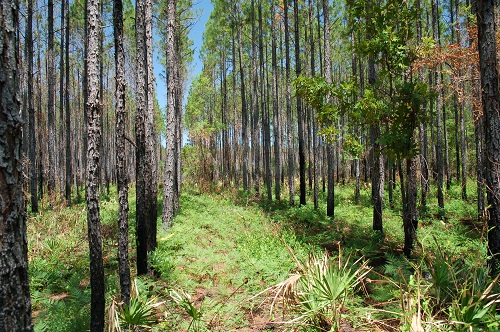
Economics Shapes Every Conversation
The U.S. Department of Agriculture may soon approve commercial production of genetically modified eucalyptus trees in the U.S. The conversation around why we should embrace widespread planting of this tree is revealing of the economic paradigm in which we operate.
The U.S. Department of Agriculture may soon approve commercial production of genetically modified eucalyptus trees in the U.S. The conversation around why we should embrace widespread planting of this tree is revealing of the economic paradigm in which we operate.
Eucalyptus trees mature three times faster than the pine trees that are grown on plantations in the U.S. to produce biomass for energy, offering an alternative to fossil fuels that release lots of carbon dioxide. However, conventional eucalyptus can be killed by freezing temperatures, making them unsuitable for the southeastern U.S. where many biomass plantations are located. The genetically modified version of the trees is frost hardy down to 15 degrees F, which means eucalyptus can be grown in southeastern states, allowing faster production of wood for biomass and, according to supporters, curtailing climate pollution. That’s the potential benefit.

Pine plantation in Florida. Credit: Joe Davis/Florida Fish and Wildlife CC BY-ND 2.0
The downsides are that eucalyptus are thirsty trees that need a lot of water, burn easily, are hard to kill, and can spread to where they aren’t wanted (and genetic modification may enable eucalyptus to become invasive beyond the warm climates where they are already a problem). In addition, the main reason for planting them—to produce energy with less climate impact than fossil fuels—may not be valid: according to researchers, biomass may not provide much, if any, climate benefit.

Grove of eucalyptus trees. Credit: John Morgan CC BY 2.0
Thus, if the main benefit of modified eucalyptus is questionable, and the trees have multiple drawbacks, it seems like the conversation should be over.
But it isn’t. The news coverage of genetically modified eucalyptus includes references to the economic impacts of approving these new eucalyptus and growing them in place of pine plantations.
Because our economy and society operate within the scarcity paradigm, which assumes that our highest priority always is to produce more goods and grow the economy, even conversations that would seem to have nothing to do with the economy end up involving the economy. Whether to grow trees for biomass that might reduce climate pollution and whether to start planting a genetically modified tree are questions about how best to ensure a clean and livable environment. Yet these decisions are happening within the confines of our long-standing assumption that the biggest threat facing is us is scarcity. That fear of not having enough jobs or money or stuff influences the conversation we have about environmental decisions.
Here are two examples of how the scarcity paradigm shows its influence in news coverage of freeze-tolerant eucalyptus.
- The company that has developed the new eucalyptus argues, in the words of The Hill, “a supply of high-quality and cost-effective hardwood is needed to sustain the pulp and paper industries.” The health of the pulp and paper industries is another way of commenting on whether we will be able to keep producing more jobs, money and stuff.
- The Washington Post notes the company has argued that approving the trees will enable the U.S. to continue expanding its exports of biomass. The talk of expanding exports is a reference to whether we can add jobs and increase our income.
Neither of these points have any bearing on what seemed like the main question—how to produce energy with less climate pollution. These economic arguments may have no relevance for the USDA’s decision of whether to approve the modified eucalyptus, but their presence in this conversation is yet another reminder of how strong the scarcity paradigm is.
Topics
Authors
Elizabeth Ridlington
Associate Director and Senior Policy Analyst, Frontier Group
Elizabeth Ridlington is associate director and senior policy analyst with Frontier Group. She focuses primarily on global warming, toxics, health care and clean vehicles, and has written dozens of reports on these and other subjects. Elizabeth graduated with honors from Harvard with a degree in government. She joined Frontier Group in 2002. She lives in Northern California with her son.
Find Out More

Beyond the politics of nostalgia: What the fall of the steel industry can tell us about the future of America

Bumbling toward utopia

What’s wrong with the systems we rely on?

